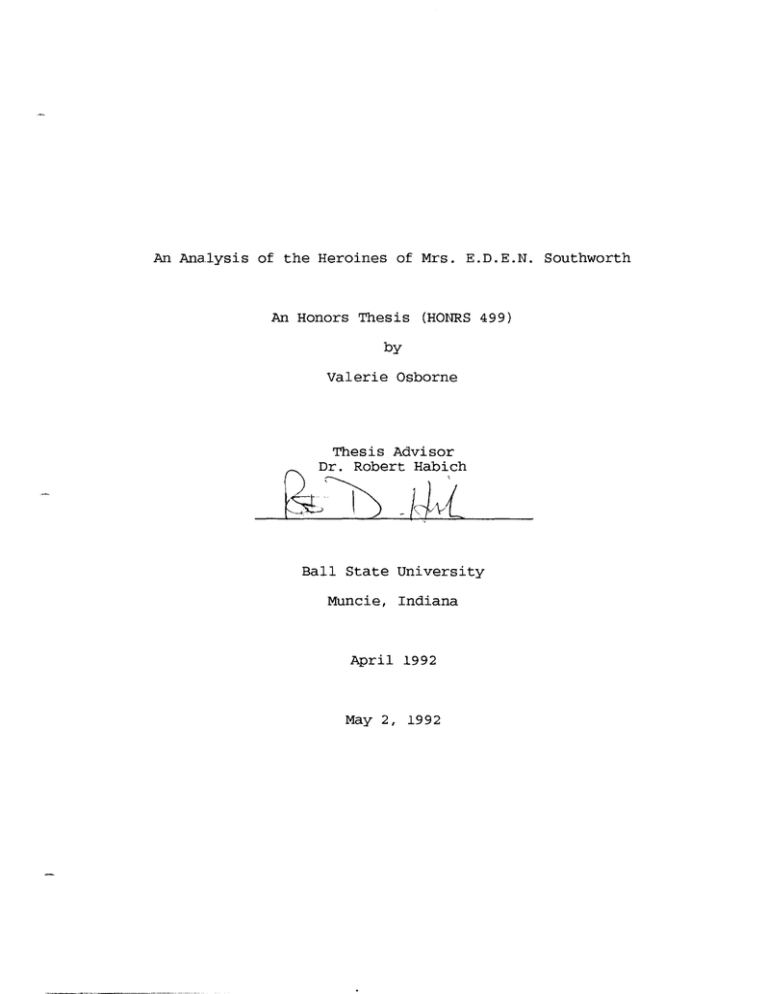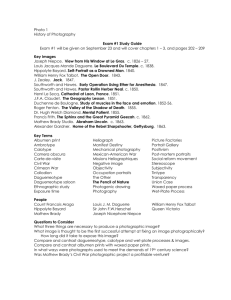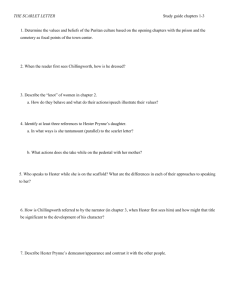An Ana.lysis of the Heroines of... An Honors Thesis (HONRS 499) by
advertisement

An Ana.lysis of the Heroines of Mrs. E.D.E.N. Southworth
An Honors Thesis (HONRS 499)
by
Valerie Osborne
t)
Thesis Advisor
Robert Habi"ch
~r.
rss:h
-Mv{
Ball State University
Muncie, Indiana
April 1992
May 2, 1992
•
~I '!
Purpose of
Tt~
Thiel discussion of Mrs. Southworth's work focuses on four of
her novels:
Retribution (1849), The Curse of Clifton (1853), The.
Hidden Hand (1859), and The Bride's Fate (1869).
In her own life,
Southwort:h had many obstacles to overcome, and her heroines
reflect t:his.
Although in many ways Southworth was an independent
woman during the 1800s, she was also dependent on others, such as
her editor, for support and financial bonuses.
In many ways
Southwort:h's characters reflect this same paradox of independence
while yet being dependent.
-
I
&rona Dorothy Eliza Nevitte Southworth (1819-1899) was
the first child of Captain Charles Le Compte Nevitte, a
merchan1: from Alexandria, Virginia, and Susannah Wailes of
St.
Ma~{'S
county, Maryland.
At the time of their marriage,
her mother was fifteen and her father forty-five.
Although
she nev.ar outwardly states that her parents' marriage was an
unhappy one, large separations in age between the husband and
wife
aro::~
often portrayed as deplorable in her novels, as can
be seen in the marriage of Major Clifton and Georgia in The
curse of Clifton.
-
their
m~rriage
Emma's mother was so young at the time of
that she could not be separated from her
mother, and they lived together in a house in washington D.C.
for several years.
Emma's childhood was not a happy one.
She does not
describe herself as pretty, "except for a pair of large, wild
eyes" (Dobson xiv).
At the age of twelve months, she
suffered an eye inflammation which resulted in a temporary
loss of vision that lasted until she was three.
Her father
died when she was four, and at his deathbed both she and her
sister, Charlotte, were baptized into Roman Catholicism.
It
is here that she earned all of her initials, although their
use was a characteristic flourish.
Her last memory of her
father consists of him laying his hands on their heads and
blessing them.
His death sent the family, which now
consisted of four women, the grandmother, the mother, and the
2
two chL_dren, into financial hardship because they were left
unsupported in an age that offered no employment for middle
class women.
Fortunately, her grandmother had a small
income, and before his death, her father had rented a large
house on a long-term basis.
Her grandmother also tried to
run a s4:!lect boarding house, but failed because her breeding
never p4:!rmitted her to present a bill.
When Emma was six, her mother married Joshua L. Henshaw
of Boston.
Henshaw had been Secretary to Daniel Webster, and
later opened a school in which he and his wife both taught.
Emma
lea.rned quickly, and she soon became head of the class.
She enjoyed reading anything she could get her hands on.
At the age of sixteen, Emma graduated from her
stepfather's school and began her career as a school teacher.
At twenty-one she married and moved to Wisconsin with her
husband, Frederick Hamilton Southworth, an inventor from
Utica, New York.
She never publicly stated that her marriage
was an unhappy one;
however, in 1844, she left Wisconsin as
an expectant mother with a small child in hand, and it is
unclear whether or not her husband returned to Washington
with her at this time.
Her grandmother, her dearest friend
in childhood, attempted to help her, but her step-father
interfered and she was left penniless.
Her husband had no
intention of supporting her or the children and promptly left
for Brazil.
-
After his departure, Emma began teaching in the
Washington Public schools, and received about $250 yearly for
3
-
it.
It was also at this point that she began writing short
pieces 1:0 be published in the newspapers, particularly in the
Nationa.L Era.
In 1845, her first story, "The Irish Refuge"
was published in the Baltimore Saturday Visitor, and her
second story was printed in the National Era.
In 1847,
"Retribution," her first full-length novel, was published in
serial .in the National Era.
Her writing proved to be her
financial salvation, although she still had to teach to make
ends me·et.
Southworth's writing career was a very prolific one.
Between 1849 and 1860, she wrote eighteen novels.
Among
these eighteen are two that are said to be her best works:
The curse of Clifton, which was serialized in 1852 and
published in 1853, and The Hidden Hand. which was serialized
in 1859.
Although these are said to be her best works, she
had many novels that were also popular.
For example,
Retribution, serialized in 1849, was so popular that it was
republished in book form by Harpers in the same year (Baym
112).
Also, The Curse of Clifton joined uncle Tom's Cabin
and Charles Dickens' Bleak House on the list of 1852s three
best-selling fiction titles (Papashvily 118), and The Hidden
Hand found company with
Dickens' A Tale of Two Cities,
George Eliot's Adam Bede, and Thackeray's The Virginians on
the list for 1859.
least forty
-
The Hidden Hand was also made into at
different dramatic versions, and as a side note,
in 1861, when she visited England with her children, she
4
-
watched one such version of the novel, and saw John Wilkes
Booth play the outlaw, Black Donald (Papashvily 126) .
Southworth may have been the greatest publishing
success in the United States during the nineteenth
centur~,
althoug:rl it is difficult to tell exactly how popular she was
since
m~ny
of her novels were serialized more than once
before they were allowed to be published.
For example, The
Hidden Hand, first serialized in 1859, was serialized twice
more before going to publication in its first edition as a
book in 1889 (Baym 114).
Another complication is that
several of her novels were republished under different names.
This is true of, for example, The Hidden Hand.
which was
republished as Capitola's Triumph, and The curse of Clifton
as Eallen Pride and The Mountain Girl's Love (Baym 114).
In 1856, when Southworth made a contract with Robert
Bonner it would prove to be her financial, and in some ways
physical, salvation.
Bonner would also prove himself to be
the father figure she never really had, both to her and to
her children.
For Southworth, as for most of his authors,
Bonner acted as a friend, advisor, and banker as well as an
employer.
In a letter written to him she writes, "the first
day that you entered my little cottage was a day blessed
beyond all the other days of mY life . ... You came to me, and
saved my life"
(Dobson xviii).
Southworth did not have the
best of health before she signed with Bonner, but the
-
security, prestige, sympathy, and understanding he offered
her were the things she needed most, and he readily gave
5
them.
Some examples of the things he did for her include the
facts that:
He wrote her frequently;
he advised her about her
children, her money, and her book rights;
helped her needy relatives;
place on the Ledger;
he
he gave her a star's
he promised to continue her
salary if she were ill; he and his family exchanged
visits with her; and he sent her presents and large
bonuses.
(Papashvily 131)
At one point, Bonner even offered to buy her son, Richmond, a
replacement if he were drafted to serve in the Civil War
(Dobson xviii).
Another time, Bonner undertook the task of
dealing with Southworth's publisher, T. B. Peterson, because
he had the book rights to her Ledger serials, and she wrote,
"Peterson won't give any more than he can help.
for me"
(Papashvily 125-126).
Do your best
Robert Bonner also considered
himself to be a very ethical man, and he wanted his paper to
reflect his own moral standards.
In 1844, Bonner, upset by a
story submitted by Sylvanus Cobb that dealt with masters
having illegitimate children by their slaves, wrote, "I will
not print anything in the Ledger that I cannot read aloud to
my children"
(Noel 93).
Once Southworth reached the $50 per
week pay rate, Bonner never gave her a raise, but he
continually helped her family, and often gave her bonuses.
However, it is in light of the role that Bonner played in her
-
life that he becomes important.
Southworth, a mother of two
children who had been forced to become totally independent in
6
-
children who had been forced to become totally independent in
an era that did not make this an easy task, was
dependent
upon herself and her writing capabilities, but at the same
time was dependent upon Bonner for the things that he offered
her.
Ir:. this way, Southworth's life resembles those of her
charactE!rS, because there is the same paradox working in most
of the lives of her heroines, and these heroines also are
affected by the standards of her time period.
II
In Retribution, Southworth tells the story of Hester
.-
Gray, a young, innocent orphan who has been sent away to
boardin9 school, where she is to learn the proprieties of
being a woman in charge of a large estate.
Hester, whose
appearance is as colorless as her name, is an easy prey for
another young girl at the school, Juliette Summers, also an
orphan, who is a beautiful girl with an Italian background
whose only interest is in herself.
person
~Nhose
Hester is a very trusting
blind innocence leads her to believe that she
has found a true friend in Juliette.
However, Juliette only
participates in the friendship because she realizes that
someday it might be to her advantage to have a rich friend.
Eventually, Hester's guardian, Ernest Dent, comes to call her
home, and Hester willingly bends to his will.
-
willingly do anything Ernest suggested.
Hester would
Eventually, the two
get married, and she would do anything to please him.
7
--
Hester is like a child that Ernest has to instruct, and
she even writes in a letter to Juliette that she is "his
child;
my eyes wait on him all day,
forever and learn"
(19).
I could sit at his feet
Hester is, as was expected of all
ladies of class, the perfect example of submission, and again
she writes, "His slightest intimation has for me a divine
authority, it is happiness, enthusiasm, religion, to obey it"
(19) .
Hester is also a highly religious woman, as all ladies
of good breeding were expected to be.
This is seen when,
while pregnant, she suddenly finds herself temporarily blind,
and instead of blaming God, she looks for the fault within
herself.
She writes to Juliette, "I was softened, and I
wept, Juliette, as I remembered that 'the Lord loyeth whom he
chasteneth' and thought how I had slighted the Lord who loved
me; and I prayed, and was composed"
(32).
Shortly after the birth of her baby, whom she names
Juliette, her friend comes to stay with her, and her health
begins to fail.
In her innocence, Hester does not see that
Ernest and Juliette have fallen in love with each other, and
at her deathbed Ernest tries to tell her that he has done
wrong by her.
Hester, of course, will not listen to her
paragon of virtue trying to defile himself, and she dies
without being able to forgive him for what he has done simply
becausE! he could never tell her.
-
While she lived, Hester made every effort to do the
right thing by everyone, including the slaves who worked on
8
--
her land.
At one point, Hester and Ernest had planned to
free all of the slaves but she dies just a few hours before
she came of age.
She never had a bad thing to say about
anything, and at her death, a neighbor cormnents to Juliette
that "we have had a great loss - I and you, the family, and
the whole neighborhood.
We now know that 'an angel has
sojourned with us' for we have seen 'the glory of her
vanishing wing"
(68).
Shortly after her death, Ernest, now forty-five, and
Juliette, twenty-two, marry, but it does not remain a happy
marriage for long.
As stated earlier, gaps in age between
husband and wife are often presented in an unfavorable light
by Southworth, and this marriage is no exception, because it
seems to be doomed from the start.
Ernest begins to resent
the attention that she receives, and money begins to run
tight as a result of her extravagant spending.
Juliette
resents his harsh reprimands and refuses to yield to his
authority because she is too strong willed and stubborn.
She
is presented as the epitome of wickedness, and is said to
have "evil eyes that could not cease from sinning"
(70).
She
creates trouble for other characters and enjoys trying to
manipulate people with her charm. Eventually, Juliette leaves
Ernest and meets with a horrible fate, and Ernest realizes
that she was sent to punish him.
At the end of the novel,
the narrator explains the difference between different types
-
of retribution, and one cannot help but feel that this is the
author's own opinion.
She states:
9
Divine retribution belongs to eternity, and is
distant and vague.
Human retribution is uncertain,
depending upon discovery and other fortuitous
circumstances, but Moral retribution is as sure as
life, as sure as death, as sure as the
~
out of
whose bosom it springs, as natural as the pain that
follows the contact of fire ....
Human and Legal
retribution we may elude by concealment; Divine
retribution we may avert by a timely repentance;
but Moral retribution we must suffer;
and that,
not by the arbitrary sentence of a despot, but by
the natural action of an equitable law old as
Eternity, immutable as God.
(108)
In this novel, Southworth puts forth the idea that being
child-like with wide-eyed innocence is not as good an idea as
the women of her time thought it was.
This can be seen in
her treatment of Hester whose character never seems to get
beyond the age of ten.
Hester meets with an early grave as a
result of her innocence, and never sees beyond the surface of
the things that happen around her.
She is taken in by both
Juliette and Ernest, and never comprehends what is really
happening to her.
She appears to be an easily fooled dupe,
and people realize this and take advantage of her.
Hester's
character refutes the idea that women should be submissive in
all things in order to show their good breeding by showing
the reader that innocence in action is fine, but innocence of
mind can be dangerous.
Southworth creates the character of
10
JuliettE, to act as a foil for Hester, and the two could be
viewed a.s exact opposites.
Whereas Juliette is beautiful,
with a dark complexion and black hair, Hester is pale and
colorless with no beauty in her plain appearance.
Hester is
naive and childish while Juliette is aware of herself and her
beauty.
She knows what it does to men, and knows how to fool
people with her charms.
In The Bride's Fate, Southworth presents the reader with
a character who has been greatly wronged by her husband.
Drusilla Lyon, who has married Alexander Lyon, the nephew of
old
GenE~ral
Leonard Lyon who resides at Old Lyon Hall, finds
herself alone and pregnant after their first night of
marriag!~.
When her husband leaves her, she is forced to
leave their home and rely on the mercy of his uncle and his
granddaughter, Anna.
While staying with his family, she
learns ·that her errant husband has gone off to England, and
Drusilla. is left a fortune by a wealthy relative.
After some
time, the whole family decides to go on a trip to England,
and her·e a whole new batch of trouble springs up for
Drusilla..
While they are in England, her son is kidnapped as
a result of a title that Alexander claimed by the right of
his mother, because another man could also have claimed the
title, and he is gone for almost a month.
Drusilla is never
told the whole story behind Lenny's disappearance, but when
Alexander returns the child to her, she forgives all of his
-
faults.
11
-
DDJsilla is an example of a character type that David
Reynolds calls the
II
mora 1 exemplar"
(339).
Southworth
presents her as a woman who has every right to be angry with
her husband;
however, she chooses to remain true to him and
to pray for his return.
Women in Southworth's time were
expected to be morally superior in all things, because men
were thought to be totally incapable of morality, unless
there was a strong woman to guide him in the proper
direction.
Cunnington shows this when discussing the new
breed of Lady that was rising in the 1850s.
He states that
the "Perfect Lady was claiming to establish a standard of
correctitude towards which it was the duty of Man to
struggle, ... " (142).
The use of the moral exemplar was a
means, states Reynolds, "of reconstructing moral value in a
world of devalued, amoral males"
(342).
In The Bride's Fate,
Southworth goes to great lengths to show how far the amoral
male has gone astray, while showing how strong a figure the
moral exemplar was.
While Alexander is off running about in
London, totally neglecting his duties as a husband and
father, Drusilla remains strong and faithful to her cause.
She gets along fine without her husband, taking charge of
little Lenny and her own accounts with skill, thus becoming
almost independent.
However, she relies on General Lyon's
good nature to have a place to live throughout most of the
novel, and her only true desire for herself is to get
Alexander back.
She is displeased when any of her servants
or relatives speak badly of him, and she always has the faith
12
-
that he will return and see the error of his ways.
The other
charact'2rs are continually stopping in mid- word to avoid
calling him names that Drusilla does not wish to hear, as
when, after she learns that he has sold their home, her
relatives say things like, "Yes, sir, that vill- I mean Mr.
Alexander Lyon- has sold Cedarwood"
scound- I mean Alick- go"
(31).
(30), and,
"S0
let the
Even the whole time that
Lenny was missing, she kept up her faith that he would be
returned.
She continually prayed, slept very little, ate
less, and was often gone out looking for her child.
When
Alexander returns the boy, the narrator states:
husband and child, both restored to her in an
instant!
there!
It is a wonder she had not died then and
But she did not even faint.
Heaven, that
had sustained her through such long-drawn-out,
unutterable sorrows, gave her strength mow to meet
the sudden shock of joy.
(399)
Throughout her trials, Drusilla shows that she is capable of
handling very heavy burdens without falling to pieces, as
most women of her time were expected to do.
She shows that
she has strength and courage that cannot be easily shaken
because she knows that her belief in Heaven will sustain her.
She shows the reader that it is possible for a lady of good
breeding to stay together after something disastrous happens,
giving women the courage to not faint at the slightest
-
mishap.
Southworth indiscreetly shows the reader that women
are made of stronger stuff than most people imagine, and that
13
-
they nef2d not give in to societal expectations of feigned
weakness.
In The curse of Clifton, Southworth again presents the
reader
'~ith
a very strong and moral character, who could even
be said to be a bit stronger than Drusilla.
Kate Kavanagh,
the heroine of this novel, is only a young girl when the
reader first meets her, but even then one can see her moral
and mental strength.
Although she is not a young lady from a
good family, a fact that is often held against her, she
exhibits the same qualities that are expected from ladies of
better breeding.
Within the first meeting, the reader sees
her, at age fourteen, taking care of a grandfather who
becomes delirious after drinking, and keeping the house in an
orderly fashion because her parents are not around.
She also
has to take care of her brother, Carl, who says, as males in
general would probably have said at that time, "I hate to see
strength in women!
anyhow!" (35).
It don't belong to them, nor grace them,
But Kate continues to be a strong character
throughout the novel, even though she faces many
difficulties.
In this same scene, the reader also realizes
that Captain Archer Clifton, the main male character of the
novel, is entranced by her, even though she is not described
as being a particularly beautiful girl, only as one with
strong features.
However, Captain Clifton cannot admit to himself that he
-
has more than a distant interest in her well-being, but takes
it upon himself to secure a better position for her, and for
14
her br01:her also.
Kate finds herself gradually falling for
Archer, but she knows that he is engaged, and she reprimands
herself harshly for any thought that enters her mind of him
in any other capacity than as benefactor.
However, the
marriag,e, falls through, his fiance becomes extremely ill
with brain fever, and in her weakened condition she also
catches small-pox.
Therefore,her younger sister and
stepmother leave the house so as not to catch it, leaving her
with no one to wait on her.
Kate acts as her nurse, risking
her own health to do it, and undertakes the task of trying to
convince her that God does love and have plans for her.
Though she thinks that what has happened to her, as far as
the loss of her beauty is concerned, is a cruel punishment
from one who could not possibly love her, Kate convinces her
that her beauty will return, and that Archer will still love
her.
Upon returning from the service for which he was called
away, Archer does ask her to forgive him, and Kate overhears
him.
When she hears this, she thinks out loud, "Thank God.
Thank God!.
sincerely.
Oh, Merciful Father, help me to say that
Thank God!"
(254).
This scene shows how devoted
Kate was to doing the proper thing, even though she may now
be unable to realize her own unspoken desire.
Eventually, Kate and Archer do get married;
however,
their happiness is doomed before they are married as a result
of a mistake Kate made.
-
Mrs. Georgia Clifton, who married
Archer's uncle when she was only fifteen and he is already
referred to as "an old man," turns her eyes toward Archer,
--
15
long before he and Kate are married, and before her husband
dies.
Georgia is portrayed as a scheming woman who attempts
to get
'~hat
she wants using any method which will serve her
purpose, and is very similar to Juliette of Retribution in
many ways.
Georgia, who wants Archer for herself, begins to
try to come up with a plan to separate them, when she takes
advantage of the error Kate made.
However, her plan does
not fully succeed because Archer still marries Kate, but he
treats her badly while not telling her the cause for this
sudden change.
Kate complies with his wishes, and later
learns that he is immediately going back into military
service.
He tells her that she will be left in charge of
the estates, and he wants her to get them out of debt if
possible.
He no longer treats her as an equal but as a
deceiver who has greatly wronged him, and he leaves, wishing
her to never be in contact with him unless it is absolutely
necessary.
While he is gone, Kate lives up to his
expectations of her, even though he is not there to see it,
and she manages the estates well and gets them out of debt
very rapidly.
She shows that she is capable of holding her
own, in financial as well as moral matters, and eventually
Archer discovers the truth in what a great wrong he has done
her.
Archer comes back to her with a repentant heart, and
Kate willingly takes him back, just as Drusilla did in The
Bride's Fate.
-
Throughout The Curse of Clifton, Kate shows her strength
in both moral and mental matters, and she also shows that she
16
can be caring and independent at the same time.
Like
Drusilla, Kate shows that she is capable of withstanding
great shocks without crumbling under the pressure, and
althougl1 some of the characters might attribute this to the
fact. that she was not a well bred lady, she demonstrates that
every woman has the right to make of herself as she chooses.
For
the most important choice is to always do the thing
KatE~,
that is morally right, no matter what the personal cost may
be.
Kal:e also has that same paradoxical nature of being both
independent and dependent, because the things she does while
Archer is gone are aimed at making him see how wrong he is
about
-
him,
ht~r.
sht~
Even though she is capable of going on without
still holds the faith that he will return and see
the error of his ways.
Kate goes through many trials before
her errant man returns to her, but she manages just fine
without him, as any woman should be able to do, or so
Southworth implies.
In The Hidden Hand, Southworth presents a new kind of
woman in the heroine, Capitola.
Unlike her other heroines,
Cap, as she is called, has a mind and will of her own, and
she goes to great lengths to see that she gets what she
wants.
When the reader first sees Capitola, she is dressed
as a boy, selling newspapers in New York, because she has
been left, through a strange series of events, without a
parent or guardian.
--
After hearing the story of an old dying
woman, Major Warfield of Hurricane Hall goes out to find her
and bring her home.
He acts as her adoptive uncle throughout
-
17
the novel although he is of no blood relation to her, and he
attempts to make Capitola conform to societal standards for
women.
Capitola, having had no real female role model to
follow, takes every opportunity possible to rebel in small
ways against these standards.
She rides out alone, even
though she has been forbidden to do so, and she almost gets
herself into grave danger by doing this, but her wits save
her.
When approached by a strange man, who insists that they
stop and sit down to talk, Capitola finds an excuse to not
sit until he is tried of playing the game.
Capitola then,
saying that the ground was damp from a recent rain, suggests
that he take the saddle blanket off of his horse for her to
sit on.
He does this, and once the saddle is off the horse,
Capitola jumps on her horse and rides away, leaving the man
standing there with the blanket in his hands.
Later on in
the novel, this same man will become angry with her because
she refuses to marry him, and he decides that to get even
with
he~r
he will make light of her character in public.
As
a result of his insults, Capitola again uses her wits to
humiliate the man by "wounding ll him in a duel with guns that
shoot c.ried peas, and he never bothers her again.
Capitola also has similar troubles with the novel's
villain, Black Donald.
Upon once seeing her, he decides that
her spirit intrigues him and wants to carry her off and marry
her.
-
~~e
first time the attempt is made, he sends his
henchmEm to do the job for him, but Capitola outwits them,
too.
~~e
last attempt to abduct her almost ends in Black
18
--
Donald's death, because he decides to get her himself.
However, by using her wits, she manages to outsmart him.
Capitola is a different character from the rest because
she lacks the markings of a true woman during the 1800s.
Major Wa.rfield explains to a minister that "Cap isn't
sentimental! and if I try to be, she laughs in my face!"
(175).
Capitola is truly a character who has no use for the
f emininl:! standards that have been imposed upon her, and she
does her best to let everyone know it.
She does not like to
have to be escorted by the groom when she goes out riding;
she does not like to be unable to use the language that she
was accustomed to using before Major Warfield came and
brought her home; and she does not believe that she is
helpless, simply because she is a woman.
Capitola loves
nothing better than a bit of excitement, because she finds
life at Hurricane Hall quite dull most of the time.
III
In her novels, Southworth portrays many types of women.
She often shows the reader a character who is purely good and
moral, but she also portrays many women who are scheming,
strong 'willed, and self-centered.
Southworth develops her
characters well, and although there appear to be
inconsistencies, a closer look shows that she is trying to
-
deal with the expectations of her time period.
Occasionally,
her characters even go against the prescribed standards of
19
her time::;!, and Southworth's opinion comes through without her
directly stating it.
SO"..lthworth presents the reader with heroines that are
often
"very
intelligent, moral, and independent.
However,
many times the whole reason that they are so independent is a
result of something that has happened to them, usually caused
by a man.
These characters have been forced, as Southworth
herself was forced, to carry on as if nothing had happened.
They thrive on being able to rely totally on themselves, but
their whole purpose in having the appearance that nothing has
changed is a ploy to win the man back.
In this way, the
heroine attempts to regain the respect that the man owes her,
especially when she has done nothing to merit his
displeasure, and it usually works, as long as the character
remains as virtuous as she is supposed to be.
This paradox
in Southworth's characters could be directly paralleled to
the paradox in her own life, as seen in her self-sufficiency,
but reliance on Bonner.
While the errant man is away, the
characters do everything within their power to make sure that
the man's name is not defiled in front of them, even though
there is usually just cause for it, and they do whatever it
is that they think to be the actions that the man would want
them tc take, based on what was considered proper conduct for
a lady at that time.
In some novels, a character is
presented that is not capable of being independent, and
-
these characters could be seen as making a statement about
the roles of women.
20
EvEm
though many did approve of her writing, there were
some who did not.
Lady's
E~,
Sarah Josepha Hale, editor of Godey's
praised her for the passion she put into her
novels, but was uneasy about her "freedom of expression that
borders on impiety" because she continually portrays women
who challenge the restraints of genteel womanhood (Dobson
xxvi).
Hale also felt that Southworth went "beyond the
limits prescribed by correct taste or good judgment" (Baym
113).
jUso, after the publication of her first long serial,
The Des-;rted Wife, the
Post
felt obligated to apologize
publicly for the work because it "dealt a little too
seriously with a problem of marital incompatibility," even
though ':here was a happy ending.
From this point on,
Southworth was encouraged to avoid dealing with any serious
mental or emotional problems and to stick to naturally
occurring disasters (Noel 39-40).
Southworth, through the voice of her characters, is
attempting to reject the ideas of genteel womanhood which had
been intact for so long.
Southworth does not go against the
idea that women should set the moral example, agreeing with
CUnnington's statement that a woman "was to present a living
picture of right-mindedness, illustrating to the rest the
highest attainable refinement of thought and feeling," but
she leans away from his last statement of the paragraph,
where he states that women should stand, "passively in a
bustling world as a monument to the abstract virtues" (108) .
.-
Southworth's characters disagree with the passive part of
21
that sentence, because they do not stand still and let the
world go by them as if they had no part in it.
In her time,
these w,ere the expectations of the good woman:
They never go into a passion, have no will of their
own, never laugh out loud, or go anywhere without a
gentleman, or take cheese at dinner- an odious
vulgarism!
(CUnnington 114-115)
CUnnington also states that the only reason a woman should be
educated is to get a husband, and according to the definition
of the term 'fast,' as quoted by him as it was used in the
1850s, Capitola is definitely a 'fast' character.
The term
is defined in this way:
A fast young woman has an inordinate love of
-
gaiety, a bold determined manner, a total absence
of respect towards her elders, and sometimes even
towards her parents; a flippant style of
conversation and a glaring and sometimes immodest
dress.
She is not in the least sentimental; she
does not read Scott or Byron or Moore or even Lord
Lytton.
In the country she is a daring
town she plays billiards.
rider; in
Her conversation is
full of slang--so repulsive in a feminine mouth.
(174-175)
In a world that denied women the right to vote, own property,
or speak at public meetings where both sexes were present, it
-
becomes increasingly difficult to have a sense of one's own
identity.
Tompkins states that as a result, "women had to
22
have a 'way of defining themselves which gave them power and
status nevertheless, in their own eyes and in the eyes of the
world.
That is the problem that sentimental fiction
addresses"
(160).
She also states that, "the implantation of
virtue was the primary goal of nearly everything nineteenthcentury Americans read:
textbooks, novels, poems, magazine
stories, or religious tracts"
(157).
Tompkins also feels
that "the pain of learning to conquer her own passions is the
central fact of the sentimental heroine's existence"
(172).
In her novels Southworth is subtly trying to tell her female
readers that they should not have to give up their passions,
as long as they remain moral.
She shows that strength in
women is not always a bad thing, and that it is possible to
be streng without being vulgar.
When Sarah Hale states that
Mrs. Seuthworth "borders on impiety," she is showing that she
is not yet ready to accept the fact that women are not as
fragile as eggs.
But Southworth, who was forced to become
this way fairly early in her life, is trying to show women
that they can be independent, intelligent, and moral all at
the same time.
Her characters appear to be modified models
of herself, depending on what type of mood she is in when she
is writing, and they show the world that women are capable
human beings just as much as men are.
Though Southworth never actually states her purpose in
writing her novels the way she does, a careful reading will
-
reveal that she is not simply writing the same type of
sentimEntal story that the other female authors are writing.
23
Part of the reason her novels may have been as popular as
they were could be tied to the fact that although most women
would not yet have had the courage to act as Capitola does,
she served as an ideal for what their lives could be like, if
they could only get beyond the requirements of good breeding.
Although many probably felt that they were not ready to be as
liberated as Capitola was, they enjoyed reading about a woman
who could do things that they only wished they could do.
Although she would never have viewed what she was doing as a
step toward women's rights, simply because she states that,
"there is nothing I hate on earth with a hatred so intense as
I do a she-rebel"
-
(Papashvily 136), Southworth could be
viewed as a stepping stone toward the women's rights
movement, because, in a way, she prepares women readers to
take charge of their own lives and to take an active part in
the world.
She feels that there must be women who, like she,
have been forced to become independent, and have found that
it is not such a bad thing to rely on themselves and their
capabilities instead of always being subservient to a male.
Even though she relies on Bonner to supply her with the extra
money and attention she needs, she is not married to him, and
therefore has a sense of freedom that few other women have.
She writes her novels from the viewpoint of an independent
woman, and this shows very strongly in her writing.
One sees
many similarities in the things that happen to her characters
-
and in her own life, and it does not seem that they were put
there by coincidence.
Through her characters, she is
24
-
gradually trying to wake up the interests of women toward
their
m<lIJ.
state of living.
The paradoxes that are inherent
in her own life carry over to those of her characters, and
they find themselves in the same situations.
While
Capitola's character goes a bit to the extreme in pursuing
her independence, she does end up married in the end, and is
subject to the same paradox as the others.
Southworth is
trying to put forth the idea that it does not have to be one
way or the other.
-
Works Cited
Baym, N:"na.
~nen
WOman's Fiction: A Guide to Novels by and about
in America. 1820-1870. Ithaca: Cornell UP, 1978.
Brown, Herbert Ross. The Sentimental Noyel in America 1789~~.
Durham, NC: Duke UP, 1940.
CUnning1:on, Dr. C. Willett. Feminine Attitudes in the
Nineteenth Century. New York: Macmillan, 1936.
Dobson, Joanne. Introduction. The Hidden Hand. By E.D.E.N.
Southworth. New Brunswick: Rutgers UP, 1988. xi-xlv.
Noel,
M~ry.
Villains Galore.
Papashvily, Helen Waite.
Harper, 1956.
New York:
Macmillan, 1954.
All the Hacpy Endings.
New York:
Reynolds, David S. Beneath the American Renaissance.
York: Alfred A. Knopf, 1988.
New
Southworth, Emma Dorothy Eliza Nevitte. The Bride's Fate.
New York: Grosset and Dunlap, [1869].
The CUrse of Clifton.
1970.
~he
Hidden Hand.
1988.
Eetribution.
Tompkins, Jane.
1985.
-
1889.
New York:
1886.
New York: AMS Press,
New Brunswick:
Rutgers UP,
Harper and Brothers, 1849.
Sensational Designs.
New York:
Oxford UP,






